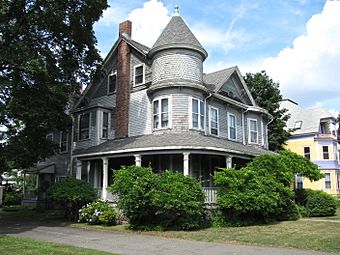Newton Highlands Historic District facts for kids
|
Newton Highlands Historic District
|
|

House on Lincoln Street
|
|
| Location | Roughly bounded by Lincoln and Hartford Sts., Erie Ave., and Woodward St., Newton, Massachusetts |
|---|---|
| Area | 19 acres (7.7 ha) |
| Architect | Walker, Samuel A.; Et al. |
| Architectural style | Colonial Revival, Late Victorian, Gothic Revival |
| MPS | Newton MRA |
| NRHP reference No. | 86001747 (original) 90000013 (increase) |
Quick facts for kids Significant dates |
|
| Added to NRHP | September 04, 1986 |
| Boundary increase | February 16, 1990 |
The Newton Highlands Historic District is a special area in Newton, Massachusetts. It covers the old and important parts of the village of Newton Highlands. This district was added to the National Register of Historic Places in 1986. At first, it included homes along Lincoln Street and other nearby streets like Bowdoin and Erie.
Later, in 1990, the district grew even bigger. It started to include more shops and businesses on Lincoln Street, between Hartford and Walnut Streets. This expansion helped protect even more of the area's unique history.
Contents
What Makes This Area Special?
The original part of the district was mostly made up of homes. Most of these houses were built between 1874 and 1911. You can see many different styles of architecture here. The most common styles are Queen Anne and Colonial Revival.
How Did Newton Highlands Grow?
The area started to grow quickly because of better train service. A local leader named James F. C. Hyde helped make these improvements. He later became the first mayor of Newton. The district also has the Hyde School, built in 1895. This school is named after him and has a Romanesque style.
Shops and Businesses
The shops and businesses added to the district in 1990 were also built around the same time. One interesting building is the old car garage at 1151 Walnut Street. It was built in 1928 and is the only building of its kind left in the area.
Important Buildings in the District
Besides homes and shops, the district also has some important public buildings.
Community Buildings
- The Newton Highlands branch of the Newton Free Library is one of these. It was built in 1886 in the Queen Anne style.
- There are also two churches in the district. The Methodist Episcopal Church was built in 1893. It has a unique Shingle style.
- The Newton Highlands Congregational Church was built in 1906. It shows off the Gothic Revival style.
 | Charles R. Drew |
 | Benjamin Banneker |
 | Jane C. Wright |
 | Roger Arliner Young |



